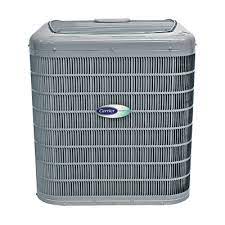
Choosing the Best HVAC Replacement System for Small Homes
Heating, ventilation, and air conditioning (HVAC) systems are essential for maintaining a comfortable indoor temperature in your home. Over time, these systems may require replacement due to wear and tear, inefficiency, or outdated technology. For small homes, it is important to choose an optimal HVAC replacement system that is appropriately sized and energy-efficient. In this blog post, we will discuss key factors to consider when choosing an optimal HVAC replacement system for small homes.
COMPARE QUOTES NOWAssess Your Heating and Cooling Needs
The first step in choosing an optimal HVAC replacement system is to assess your heating and cooling needs. This will depend on factors such as the size of your home, the number of rooms, and your climate zone. Small homes may require smaller HVAC systems, but it is important to choose a system that can effectively heat and cool your home without wasting energy or money.
Consider Energy Efficiency
Energy efficiency is an important factor to consider when choosing an HVAC replacement system. Energy-efficient systems can save you money on utility bills and help reduce your carbon footprint. Look for HVAC systems with high Seasonal Energy Efficiency Ratio (SEER) ratings and Energy Star certifications, which indicate that the system meets energy efficiency guidelines set by the U.S. Environmental Protection Agency.
Choose the Right Type of System
There are several types of HVAC replacement systems to choose from, including:
- Central air conditioning systems
- Ductless mini-split systems
- Heat pumps
Central air conditioning systems are a popular choice for small homes, but ductless mini-split systems and heat pumps can also be effective options, depending on your needs and budget.
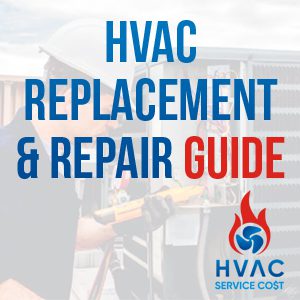
Consider Installation Requirements
Installation requirements can vary depending on the type of HVAC replacement system you choose. Central air conditioning systems may require ductwork, which can be costly and time-consuming to install. Ductless mini-split systems and heat pumps may be easier and less expensive to install but may require additional electrical work or modifications to your home’s structure.
Get Professional Installation and Maintenance
To ensure that your HVAC replacement system is installed and maintained correctly, it is important to work with a professional HVAC contractor. A professional contractor can help you choose the optimal HVAC replacement system for your small home and provide quality installation and maintenance services to keep your system running efficiently.
COMPARE QUOTES NOWChoosing an optimal HVAC replacement system for your small home requires careful consideration of factors such as heating and cooling needs, energy efficiency, system type, installation requirements, and professional installation and maintenance services. By doing your research and working with a professional HVAC contractor, you can choose an HVAC replacement system that is appropriately sized, energy-efficient, and effective at maintaining a comfortable indoor temperature in your small home. With the right HVAC replacement system, you can enjoy enhanced comfort, improved energy efficiency, and savings on your utility bills.
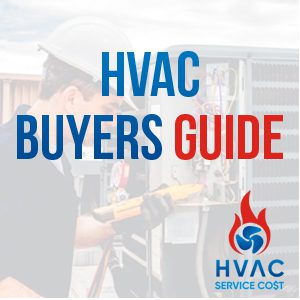
Top HVAC Replacement Systems for Small Homes
When it comes to choosing an HVAC replacement system for your small home, there are several options to consider. Here are some of the top HVAC replacement systems for small homes:
- Central air conditioning systems: Central air conditioning systems are a popular choice for small homes, providing efficient cooling throughout the home. The cost of a central air conditioning system can vary, but on average, a system for a small home can cost between $2,500 to $7,500.
- Ductless mini-split systems: Ductless mini-split systems are a versatile option for small homes, providing heating and cooling to individual rooms or zones. The cost of a ductless mini-split system for a small home can range from $3,000 to $5,000.
- Heat pumps: Heat pumps are another energy-efficient option for small homes, providing both heating and cooling. The cost of a heat pump for a small home can range from $3,500 to $6,500.
- Geothermal systems: Geothermal systems use the natural heat of the earth to provide heating and cooling, making them an eco-friendly and efficient option for small homes. The cost of a geothermal system can be higher than other HVAC replacement systems, with an average cost for a small home ranging from $10,000 to $20,000.
- High-efficiency furnaces: High-efficiency furnaces provide reliable and efficient heating for small homes. The cost of a high-efficiency furnace for a small home can range from $2,500 to $6,000.
How to Budget for an HVAC Replacement System for Your Small Home
Replacing an HVAC system can be a significant investment for any homeowner, including those with small homes. When budgeting for an HVAC replacement system for your small home, there are several factors to consider. In this blog post, we will discuss how to budget for an HVAC replacement system for your small home.
Assess Your Current HVAC System
The first step in budgeting for an HVAC replacement system is to assess your current system. How old is it? Is it energy-efficient? Does it require frequent repairs? If your current system is outdated or inefficient, it may be worth investing in a new system that will save you money on utility bills and reduce the need for repairs.
Determine Your Heating and Cooling Needs
To determine the appropriate size and type of HVAC replacement system for your small home, you will need to assess your heating and cooling needs. This will depend on factors such as the size of your home, the number of rooms, and your climate zone. A professional HVAC contractor can help you determine your heating and cooling needs and choose an appropriate replacement system.
- For homes with larger heating and cooling needs, a higher-capacity system may be necessary.
- This can significantly increase the cost of an HVAC replacement system for your small home, so it is important to factor this into your budget.
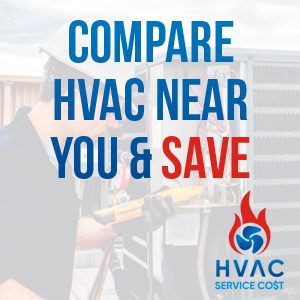
Consider Energy Efficiency
When choosing an HVAC replacement system, it is important to consider energy efficiency. Energy-efficient systems can save you money on utility bills over time and may be eligible for rebates or tax credits. Look for systems with high SEER ratings and Energy Star certifications to ensure maximum energy efficiency.
Research Costs and Financing Options
The cost of an HVAC replacement system can vary depending on factors such as the size and type of system, the complexity of installation, and local labor costs. Research costs from several HVAC contractors to get an idea of the range of prices in your area. Additionally, consider financing options such as loans or financing plans offered by the HVAC contractor or manufacturer.
Plan for Maintenance and Repairs
When budgeting for an HVAC replacement system, it is important to plan for ongoing maintenance and repairs. Regular maintenance can help extend the life of your system and prevent costly repairs while budgeting for repairs can help you avoid unexpected expenses.
The Average Cost of HVAC Replacement for Small Homes
The cost of an HVAC replacement system for small homes can range from $3,000 to $7,000 on average. The exact cost will depend on factors such as the size and type of system, the complexity of installation, and local labor costs. Additionally, you may need to factor in additional costs such as professional installation and maintenance, and repairs.
Budgeting for an HVAC replacement system for your small home requires careful consideration of factors such as your current system, heating and cooling needs, energy efficiency, costs, financing options, and ongoing maintenance and repairs. By working with a professional HVAC contractor and doing your research, you can choose an appropriate and cost-effective replacement system that will provide you with years of reliable and efficient heating and cooling.
COMPARE QUOTES NOWBest HVAC System for Small Homes in 2023
The year 2023 has brought several advanced and energy-efficient HVAC systems to the market. However, the “best” HVAC system for your small home will depend on your specific needs and preferences. With that said, we have seen several systems stand out in terms of reliability, energy efficiency, and customer satisfaction.
One of these is the American Standard. Known for their reliable and highly efficient HVAC units, American Standard has consistently been a top choice among homeowners.
American Standard HVAC Systems
American Standard HVAC systems are renowned for their quality and reliability. They offer a range of systems suitable for small homes, from central HVAC systems to ductless mini-splits. Here’s a closer look at what makes American Standard stand out:
- Quality and Reliability: American Standard is a trusted name in the HVAC industry, known for the durability and longevity of their systems. This means less worry about system failures and potential expensive repairs.
- High-Efficiency Systems: American Standard offers some of the highest efficiency ratings in the industry. Their HVAC units are designed to maximize comfort while minimizing energy usage. This is not only good for the environment, but it can also result in significant savings on your energy bills.
- Range of Options: Whether you’re looking for a central HVAC system, a ductless mini-split, or a heat pump, American Standard has an option to fit your needs. This range of options makes it easier to find the system that’s perfect for your home.
- Advanced Features: Many American Standard HVAC systems come with advanced features, such as variable speed motors for increased efficiency, and smart thermostats for easier control over your home’s temperature.
Remember, the best HVAC system for your small home is one that fits your specific needs and budget. While American Standard is a top choice in 2023, it’s essential to consider all your options and consult with a professional HVAC contractor before making a decision. This will ensure that you choose a system that provides the best performance, energy efficiency, and comfort for your home.

Central Air Conditioners for Small Homes
Choosing the right central air conditioner for your small home can make all the difference in your comfort and energy costs. Central air conditioners are a type of cooling system that circulates cool air through a network of ducts and vents throughout your home. They are one of the most effective and efficient ways to cool your entire home. However, the key to maximizing this efficiency lies in choosing the right system for your specific needs.
Energy Efficiency
When it comes to reducing your energy costs, choosing an energy-efficient central air conditioner is crucial. Air conditioner efficiency is measured by the Seasonal Energy Efficiency Ratio (SEER). The higher the SEER rating, the more efficient the air conditioner. As of 2023, the minimum SEER rating for new air conditioning units is 14, but you can find models with SEER ratings in the 20s for superior efficiency.
Energy-efficient air conditioners might cost more upfront, but they can save you money on your energy costs in the long run. Plus, they’re better for the environment!
Size of the Air Conditioner
Size is another crucial factor to consider when choosing a central air conditioner for a small home. The size of an air conditioner is measured in tons, which refers to the amount of heat it can remove from a home in one hour. A professional HVAC contractor can conduct a load calculation to determine the proper size for your home.
Choosing an air conditioner that’s too large for your home can lead to frequent on-and-off cycling, wasting energy, and resulting in uneven cooling. Conversely, an air conditioner that’s too small will struggle to cool your home on hot days and will consume more energy as it runs continuously.
Installation
Proper installation is key to ensuring that your central air conditioner operates efficiently and lasts as long as possible. Even the highest quality, most energy-efficient air conditioner won’t perform well if it’s not installed correctly. A professional HVAC contractor can ensure that your air conditioner is installed correctly and optimally configured for your home’s size and layout.
Maintenance
Regular maintenance can help keep your central air conditioner running efficiently, extend its lifespan, and reduce energy costs. This includes regularly changing the air filter, keeping the outdoor unit clear of debris, and having regular professional check-ups to keep the system in good working order.
When choosing a central air conditioner for your small home, pay attention to energy efficiency, the size of the unit, proper installation, and regular maintenance. By considering these factors, you can enjoy a comfortable home environment and lower energy costs.
COMPARE QUOTES NOWThe Role of Quality HVAC Services
Quality HVAC services play a significant role when it comes to installation, maintenance, and repair of your HVAC system. They can ensure that your HVAC system is correctly installed, properly maintained, and quickly repaired when necessary. This not only optimizes the performance and efficiency of your HVAC system but also extends its lifespan and reduces energy costs.
When selecting an HVAC service, you should look for providers with several years of experience, positive ratings with the Better Business Bureau (BBB), and a reputation as industry leaders. Let’s now explore the top eight HVAC services that embody these qualities.
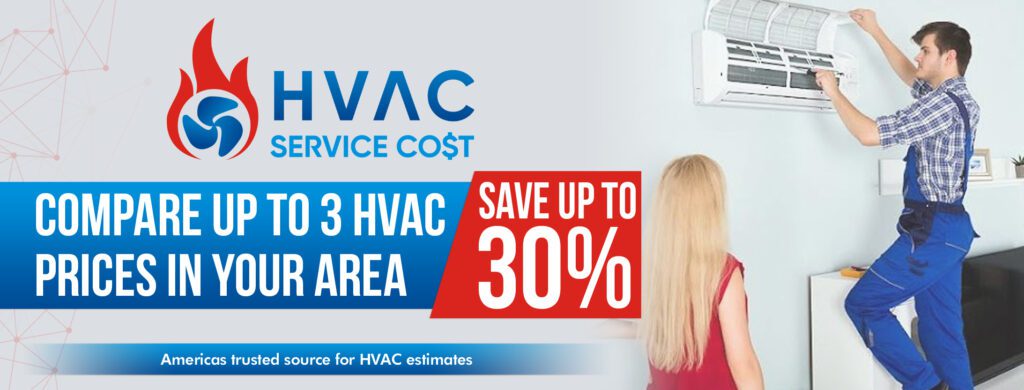
1. Lennox Residential Dealer
Lennox Residential is a leading provider of high-efficiency home comfort systems. They have a solid reputation in the HVAC industry, with a network of experienced dealers to provide top-notch installation, repair, and maintenance services.
2. American Standard Customer Care Dealer
American Standard is known for the durability, efficiency, and comfort of their HVAC systems. Their certified Customer Care Dealers are highly trained professionals with a commitment to customer satisfaction.
3. Carrier Factory Authorized Dealer
Carrier is another renowned name in the HVAC industry. Their Factory Authorized Dealers meet rigorous standards for customer satisfaction, continuing education, and are often recipients of most prestigious awards.
4. Trane Comfort Specialist
Trane is known for their reliability and high-quality HVAC systems. Trane Comfort Specialists are trained to deliver excellent service, complete a comprehensive certification process, and stay up-to-date with Trane’s latest technology, ensuring that you receive a system that is designed to achieve maximum efficiency, reliability and comfort.
5. Daikin Comfort Pro
Daikin is a global leader in heating and cooling systems. Their Comfort Pro dealers are local, independent HVAC contractors who are rigorously vetted to ensure they meet Daikin’s high standards for quality service and customer satisfaction.
6. Rheem Pro Partner
Rheem Pro Partners are trained extensively and evaluated yearly to ensure they offer industry-leading expertise and service. Rheem is a trusted brand with a range of high-quality HVAC systems.
7. Goodman A Plus Dealer
Goodman A Plus Dealers have demonstrated a high level of expertise and customer service. Goodman is known for affordable, high-quality, and energy-efficient HVAC systems.
8. York Certified Comfort Expert Dealer
York Certified Comfort Expert Dealers meet high standards for customer service, system installation, and employee training. York is known for innovation and design, providing a range of HVAC systems to meet the specific needs of homeowners.
Remember, quality HVAC service is just as crucial as the system itself. When selecting an HVAC service, look for companies with several years of experience, a good reputation with the Better Business Bureau, and a standing as industry leaders. These qualities will ensure that your HVAC system is in good hands, providing you with optimal comfort and efficiency.
Different Types of HVAC Systems Suitable for Various Environments
The HVAC industry offers a multitude of systems to cater to diverse environmental needs. Whether you reside in coastal areas or are situated in regions with varying climates, there’s an HVAC system tailored for your unique needs. Let’s explore how various types of HVAC systems work best under different circumstances, paying special attention to those designed for coastal areas, the role of a system’s parent company, and how indoor air quality and electric power are taken into consideration.
Coastal Area HVAC Systems
Living in coastal areas presents unique challenges for HVAC systems. Saltwater corrosion is a significant concern, as it can dramatically shorten the lifespan of an HVAC system. However, some HVAC systems are specifically designed to resist corrosion, even in salty air.
For example, certain units are built with specialized coatings that protect the system’s components from the corrosive effects of saltwater. Other systems have condenser coils made of durable materials, such as copper or aluminum, to better withstand the harsh coastal environment. These HVAC systems not only help to maintain comfortable indoor temperatures but also circulate warm air efficiently in cooler months, contributing to a cozy indoor climate year-round.
COMPARE QUOTES NOWThe Importance of Parent Companies
An HVAC system is often a long-term investment, which makes the parent company play a crucial role in this decision-making process. A well-established parent company can provide assurance of quality, post-sales service, and assistance with routine maintenance and repairs.
Renowned parent companies ensure their HVAC systems meet high standards for durability and energy efficiency. They’re often leaders in using the latest technology and materials to improve system performance and lifespan. Moreover, they typically have extensive dealer networks, which means that service and parts are more readily available.
Indoor Air Quality and HVAC Systems
Maintaining good indoor air quality is an important function of an HVAC system. Pollutants, allergens, and high humidity levels can negatively impact indoor air quality. Several HVAC systems on the market include features designed to improve indoor air quality.
For instance, some units come with built-in air purifiers or UV lights to kill airborne pathogens. Other systems have advanced filtration technologies that can effectively remove dust, pollen, and other allergens from the air. Some HVAC systems even have humidifiers or dehumidifiers to maintain the ideal humidity level, improving both comfort and air quality.
Electric-Powered HVAC Systems
Electric power is becoming an increasingly popular choice for HVAC systems, especially given the move towards renewable energy sources. Electric HVAC systems can be highly efficient, and when combined with solar panels or other renewable energy sources, can greatly reduce energy costs and environmental impact.
Electric-powered HVAC systems can include heat pumps, electric furnaces, and ductless mini-split systems. They offer quiet operation, reduce carbon emissions, and require less maintenance compared to their counterparts.
The type of HVAC system suitable for you depends significantly on your geographic location, the quality assurance of the parent company, the air quality inside your home, and the power source. It’s essential to evaluate all these factors to select a system that ensures maximum comfort, efficiency, and longevity.

Making an Informed Decision: Initial Cost, Product Range, and Emergency Services
When it comes to choosing an HVAC system for your small home, making an informed decision is crucial. The best choice will not only fulfill your specific needs but will also offer the best value for your investment. Consideration of the initial cost, range of HVAC products offered, and availability of emergency services are all critical components of this decision-making process.
- Initial Cost
The initial cost of an HVAC system can be a significant factor for many homeowners. It’s essential to remember that the least expensive option is not always the most cost-effective in the long run. A high-quality, energy-efficient system may have a higher upfront cost, but it can save you money on energy bills over time, and often requires fewer repairs and has a longer lifespan.
Consider the cost-effectiveness of the system. This includes evaluating its energy efficiency, the warranty period offered, and the expected lifespan of the unit. It’s also worth checking if there are any rebates or tax credits available for energy-efficient systems, as these can help offset the initial cost.
- Range of HVAC Products
The range of HVAC products available is another critical factor. This includes not only the types of systems offered (such as central air conditioners, heat pumps, and mini-splits) but also the various models within each category. For example, some brands offer basic models as well as high-end models with advanced features like smart thermostats and variable speed motors.
The best choice for you will depend on your specific needs and budget. A professional HVAC contractor can help you understand the benefits and drawbacks of different systems and models, and guide you towards the one that best fits your home and lifestyle.
- Emergency Services
Finally, consider whether the company offers emergency services. HVAC systems can sometimes break down outside of regular business hours, and you don’t want to be left without heat in the middle of a cold winter night, or without air conditioning during a heatwave. Companies that offer 24/7 emergency services can give you peace of mind knowing that help is available when you need it most.
When you’re making your decision, remember to consider all these factors. The initial cost of the system, the range of products offered, and the availability of emergency services can all impact your satisfaction with your new HVAC system. By carefully considering each of these factors, you can make an informed decision that will provide comfort and efficiency for years to come.
COMPARE QUOTES NOW


Leave a Reply